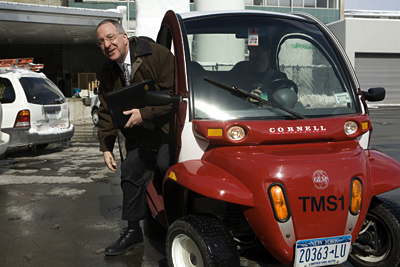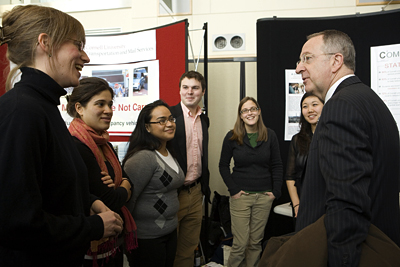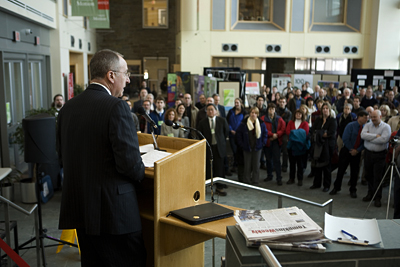Skorton proclaims campus will be energy-saving leader among universities
By Krishna Ramanujan

President David Skorton arrived at Duffield Hall in a battery-operated Global Electric Motorcar -- a small red vehicle resembling an enclosed golf cart. His Earth-friendly mode of transportation fit perfectly with his mission: to celebrate the first anniversary of his pledge to reduce Cornell's energy footprint.
On Feb. 22, 2007, Skorton signed the American College and University Presidents Climate Commitment (PCC) following heavy lobbying by the student environmental group Kyoto Now!
Speaking in Duffield on Feb. 28, he said: "In signing the Presidents Climate Commitment, I was building on earlier, ongoing efforts to reduce energy consumption and improve sustainability, something that has been a Cornell priority for years."
And he declared: "On the one-year anniversary of the signing of the PCC, I remain convinced that Cornell can and will be a leader among universities aiming for climate neutrality and in setting an example for others in our institutional commitment to sustainability."

Recent efforts, he said, include the annual 25 million kilowatt hours saved from Lake Source Cooling; the planned Cornell Combined Heat and Power Project to use state-of-the-art equipment to produce electricity and heat together with less energy expenditure than making them separately; expectations that Cornell will exceed targets for reduced carbon dioxide emissions by 2010; and increased carpooling and transit use through RideShare and OmniRide programs.

As the Cornell campus grows in size and complexity, Skorton noted, the university also has made a commitment to do its part both in reducing energy use and in mitigating climate warming. New Cornell buildings are increasingly meeting standards set by the Leadership in Energy and Environmental Design (LEED) Green Building Rating System. For example, the Alice Cook House was the first LEED- certified residence hall in New York state; Weill Hall, the new life sciences technology building, is on track to meet LEED's "gold" standards; and just last month, the Cornell Board of Trustees passed a resolution requiring that building projects over $5 million must now meet LEED "silver" standards, Skorton said.
Furthermore, Skorton said, Cornell's carbon dioxide emissions from electricity generation, heating and commuting soon will be inventoried annually because "without data, most of this is rhetoric." And, six courses this semester and eight in the fall, organized by the Faculty Climate Working Group, will evaluate greenhouse gas-reduction strategies on the campus.
Other recent efforts include emphasizing sustainable development in Cornell's Comprehensive Master Plan; reworking renovation plans to make lab and office space more energy efficient at the departmental level, as proposed by Paulette Clancy, the William C. Hooey Director of the School of Chemical and Biomolecular Engineering; and offering "vanpools" or large carpools for longer distance commuters, a Transportation Impact Mitigation Strategy that should be completed this summer.
Synergies are growing, as exemplified by a recent Advancing Sustainability Action Plan retreat that brought more than 100 people across campus together to discuss sustainability issues and build relationships, Skorton said.
The Duffield Hall event, which included staffed display booths highlighting Cornell's key efforts to address climate change, was catered by Ithaca's cooperative grocery Greenstar with mostly local food, including chocolate-covered custard pastries.
Media Contact
Get Cornell news delivered right to your inbox.
Subscribe